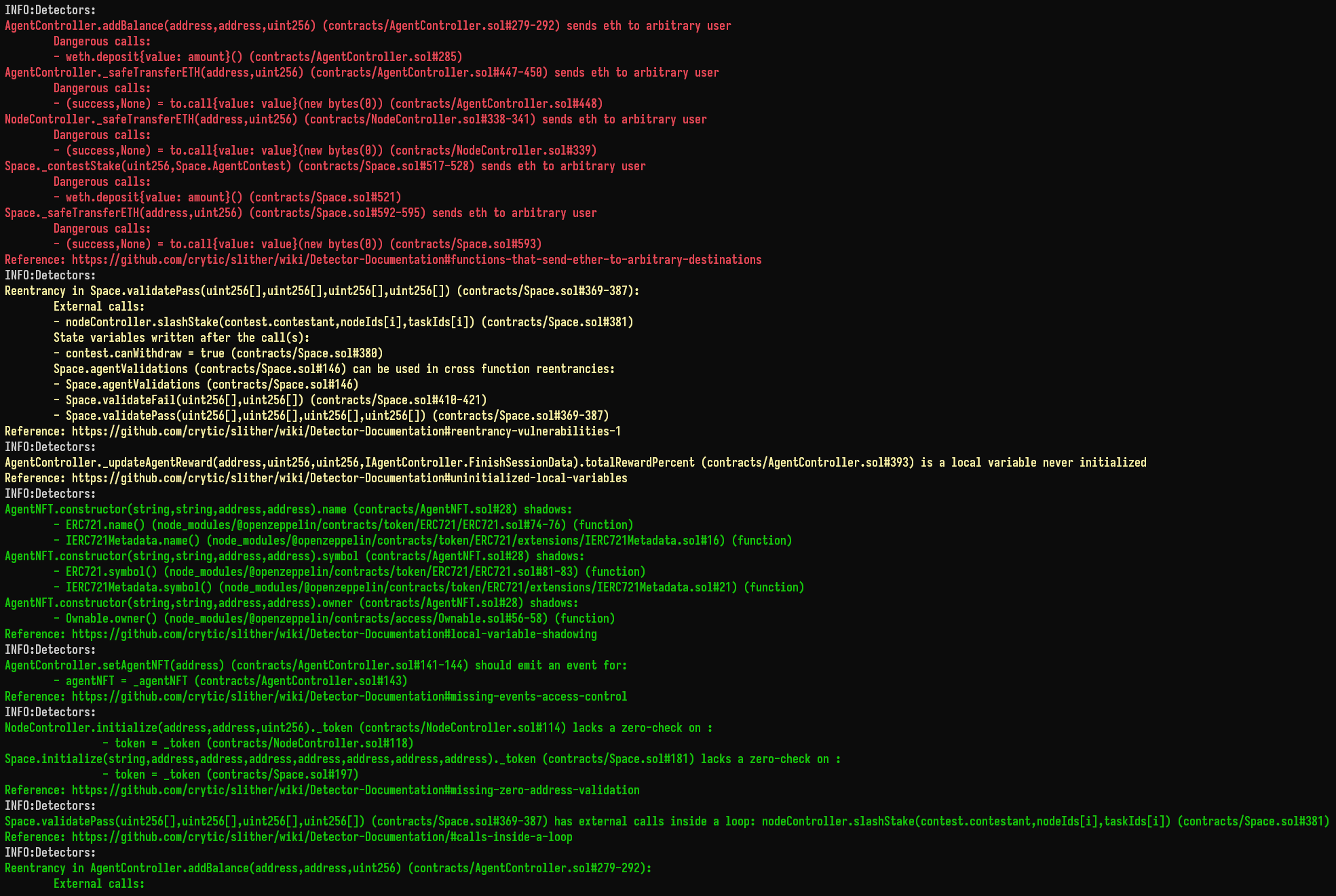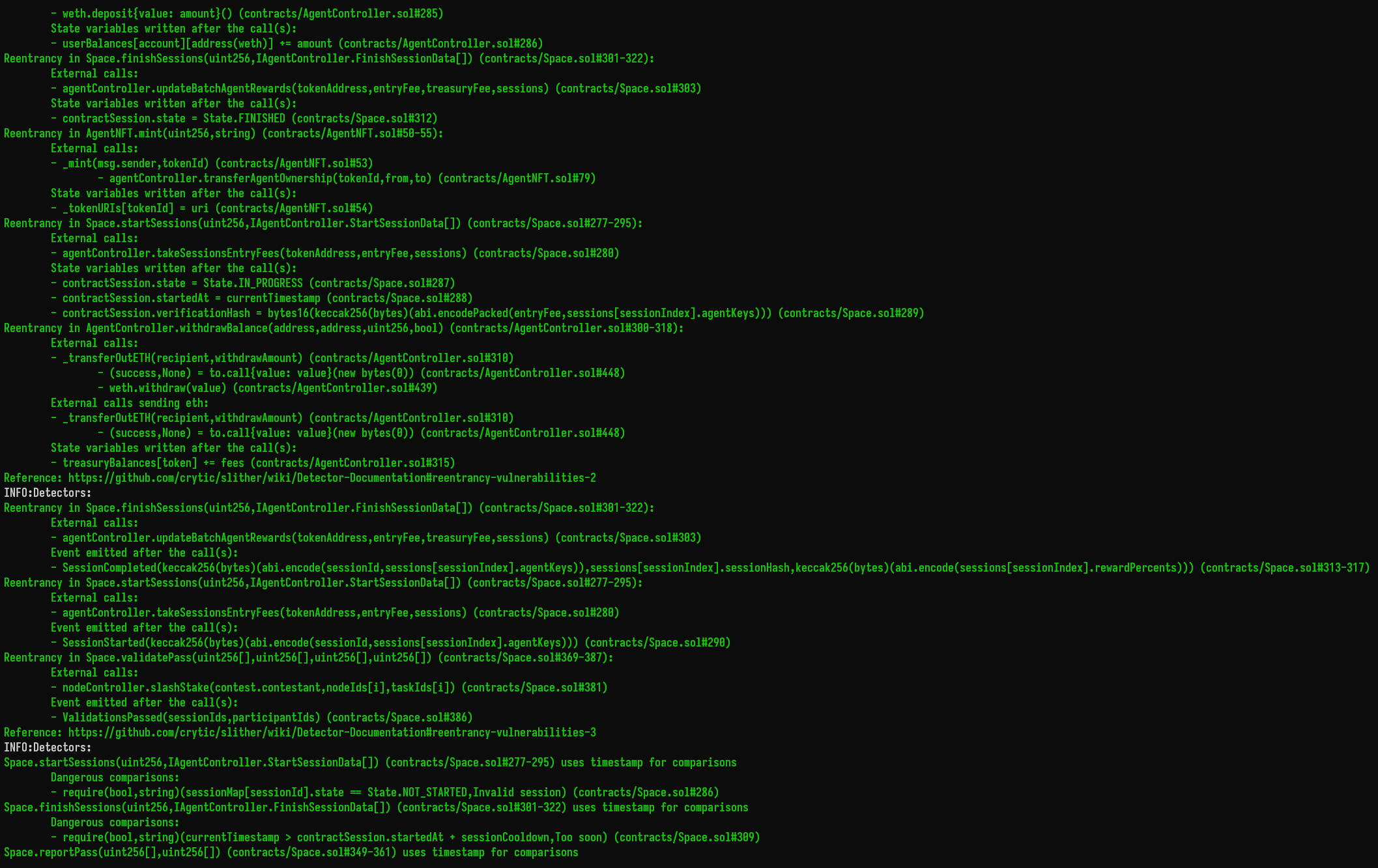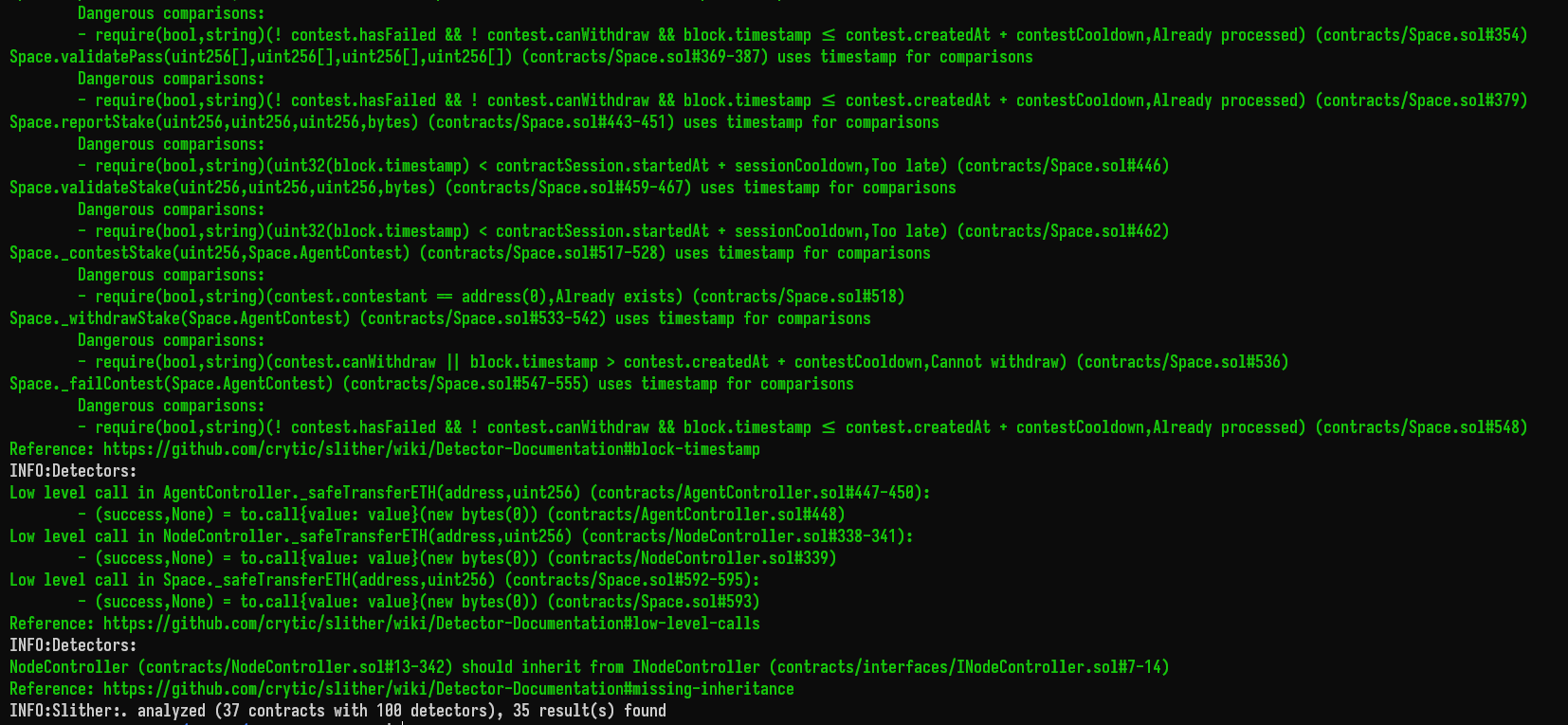Prepared by:
HALBORN
Last Updated 05/02/2025
Date of Engagement: April 15th, 2025 - April 22nd, 2025
Summary
100% of all REPORTED Findings have been addressed
All findings
15
Critical
0
High
1
Medium
1
Low
4
Informational
9
Table of Contents
- 1. Introduction
- 2. Assessment summary
- 3. Test approach and methodology
- 4. Static analysis report
- 5. Risk methodology
- 6. Scope
- 7. Assessment summary & findings overview
- 8. Findings & Tech Details
- 8.1 Frontrunning in createagent function can lead to agent theft
- 8.2 Signature frontrunning in report and validation functions
- 8.3 Potential cross-chain signature replay
- 8.4 Risk of lost ownership when using transferring nft
- 8.5 Inconsistent eth balance handling in withdrawbalance function
- 8.6 Missing _disableinitializers() function call
- 8.7 Single step ownership transfer process
- 8.8 Duplicate agent keys in session operations could lead to unintentional double charging
- 8.9 Lack of token uri validation in agent nft minting
- 8.10 Missing events
- 8.11 Missing input validation
- 8.12 Single agent failure affects entire batch in agent fee processing
- 8.13 Floating pragma
- 8.14 Use of revert strings over custom errors
- 8.15 Lack of named mappings
1. Introduction
Fraction AI engaged Halborn to conduct a security assessment on their smart contracts beginning on April 15th, 2025 and ending on April 22nd, 2025. The security assessment was scoped to the smart contracts provided to Halborn. Commit hashes and further details can be found in the Scope section of this report.
The Fraction AI codebase in scope consists of a set of smart contracts that enables the creation, ownership, and competitive evaluation of AI agents through session-based competitions with on-chain reward distribution and verification.
2. Assessment Summary
Halborn was provided 4 days for the engagement and assigned 1 full-time security engineer to review the security of the smart contracts in scope. The engineer is a blockchain and smart contract security expert with advanced penetration testing and smart contract hacking skills, and deep knowledge of multiple blockchain protocols.
The purpose of the assessment is to:
Identify potential security issues within the smart contracts.
Ensure that smart contract functionality operates as intended.
In summary, Halborn identified some improvements to reduce the likelihood and impact of risks, which were partially addressed by the Fraction AI team. The main ones were the following:
Include the intended user's address in the signed message hash to bind signatures to specific users.Include the chain ID in the signature message to make signatures chain-specific.Consider enforcing the use of safeTransferFrom() instead of transferFrom() to ensure that the contract recipients can handle the transfers correctly.
3. Test Approach and Methodology
Halborn performed a combination of manual review of the code and automated security testing to balance efficiency, timeliness, practicality, and accuracy in regard to the scope of this assessment. While manual testing is recommended to uncover flaws in logic, process, and implementation; automated testing techniques help enhance coverage of smart contracts and can quickly identify items that do not follow security best practices.
The following phases and associated tools were used throughout the term of the assessment:
Research into architecture, purpose and use of the platform.
Smart contract manual code review and walkthrough to identify any logic issue.
Thorough assessment of safety and usage of critical Solidity variables and functions in scope that could led to arithmetic related vulnerabilities.
Local testing with custom scripts (
Foundry).Fork testing against main networks (
Foundry).Static analysis of security for scoped contract, and imported functions (
Slither).
4. Static Analysis Report
4.1 Description
Halborn used automated testing techniques to enhance the coverage of certain areas of the smart contracts in scope. Among the tools used was Slither, a Solidity static analysis framework. After Halborn verified the smart contracts in the repository and was able to compile them correctly into their abis and binary format, Slither was run against the contracts. This tool can statically verify mathematical relationships between Solidity variables to detect invalid or inconsistent usage of the contracts' APIs across the entire code-base.
The security team assessed all findings identified by the Slither software, however, findings with related to external dependencies are not included in the below results for the sake of report readability.
4.2 Output
The findings obtained as a result of the Slither scan were reviewed, and many were not included in the report because they were determined as false positives.



5. RISK METHODOLOGY
5.1 EXPLOITABILITY
Attack Origin (AO):
Attack Cost (AC):
Attack Complexity (AX):
Metrics:
| EXPLOITABILITY METRIC () | METRIC VALUE | NUMERICAL VALUE |
|---|---|---|
| Attack Origin (AO) | Arbitrary (AO:A) Specific (AO:S) | 1 0.2 |
| Attack Cost (AC) | Low (AC:L) Medium (AC:M) High (AC:H) | 1 0.67 0.33 |
| Attack Complexity (AX) | Low (AX:L) Medium (AX:M) High (AX:H) | 1 0.67 0.33 |
5.2 IMPACT
Confidentiality (C):
Integrity (I):
Availability (A):
Deposit (D):
Yield (Y):
Metrics:
| IMPACT METRIC () | METRIC VALUE | NUMERICAL VALUE |
|---|---|---|
| Confidentiality (C) | None (C:N) Low (C:L) Medium (C:M) High (C:H) Critical (C:C) | 0 0.25 0.5 0.75 1 |
| Integrity (I) | None (I:N) Low (I:L) Medium (I:M) High (I:H) Critical (I:C) | 0 0.25 0.5 0.75 1 |
| Availability (A) | None (A:N) Low (A:L) Medium (A:M) High (A:H) Critical (A:C) | 0 0.25 0.5 0.75 1 |
| Deposit (D) | None (D:N) Low (D:L) Medium (D:M) High (D:H) Critical (D:C) | 0 0.25 0.5 0.75 1 |
| Yield (Y) | None (Y:N) Low (Y:L) Medium (Y:M) High (Y:H) Critical (Y:C) | 0 0.25 0.5 0.75 1 |
5.3 SEVERITY COEFFICIENT
Reversibility (R):
Scope (S):
Metrics:
| SEVERITY COEFFICIENT () | COEFFICIENT VALUE | NUMERICAL VALUE |
|---|---|---|
| Reversibility () | None (R:N) Partial (R:P) Full (R:F) | 1 0.5 0.25 |
| Scope () | Changed (S:C) Unchanged (S:U) | 1.25 1 |
| Severity | Score Value Range |
|---|---|
| Critical | 9 - 10 |
| High | 7 - 8.9 |
| Medium | 4.5 - 6.9 |
| Low | 2 - 4.4 |
| Informational | 0 - 1.9 |
6. SCOPE
- contracts/AgentController.sol
- contracts/AgentNFT.sol
- contracts/NodeController.sol
7. Assessment Summary & Findings Overview
Critical
0
High
1
Medium
1
Low
4
Informational
9
| Security analysis | Risk level | Remediation Date |
|---|---|---|
| Frontrunning in createAgent function can lead to agent theft | High | Solved - 04/25/2025 |
| Signature frontrunning in report and validation functions | Medium | Solved - 04/25/2025 |
| Potential cross-chain signature replay | Low | Solved - 04/25/2025 |
| Risk of lost ownership when using transferring NFT | Low | Risk Accepted - 04/25/2025 |
| Inconsistent ETH balance handling in withdrawBalance function | Low | Solved - 04/25/2025 |
| Missing _disableInitializers() function call | Low | Solved - 04/25/2025 |
| Single step ownership transfer process | Informational | Acknowledged - 04/25/2025 |
| Duplicate agent keys in session operations could lead to unintentional double charging | Informational | Acknowledged - 04/25/2025 |
| Lack of token URI validation in agent NFT minting | Informational | Acknowledged - 04/25/2025 |
| Missing events | Informational | Acknowledged - 04/25/2025 |
| Missing input validation | Informational | Partially Solved - 04/25/2025 |
| Single agent failure affects entire batch in agent fee processing | Informational | Acknowledged - 04/25/2025 |
| Floating pragma | Informational | Solved - 04/25/2025 |
| Use of revert strings over custom errors | Informational | Acknowledged - 04/25/2025 |
| Lack of named mappings | Informational | Solved - 04/25/2025 |
8. Findings & Tech Details
8.1 Frontrunning in createAgent function can lead to agent theft
//
Description
Proof of Concept
BVSS
Recommendation
Remediation Comment
Remediation Hash
References
8.2 Signature frontrunning in report and validation functions
//
Description
BVSS
Recommendation
Remediation Comment
Remediation Hash
References
8.3 Potential cross-chain signature replay
//
Description
BVSS
Recommendation
Remediation Comment
Remediation Hash
References
8.4 Risk of lost ownership when using transferring NFT
//
Description
BVSS
Recommendation
Remediation Comment
References
8.5 Inconsistent ETH balance handling in withdrawBalance function
//
Description
BVSS
Recommendation
Remediation Comment
Remediation Hash
References
8.6 Missing _disableInitializers() function call
//
Description
BVSS
Recommendation
Remediation Comment
Remediation Hash
References
8.7 Single step ownership transfer process
//
Description
BVSS
Recommendation
Remediation Comment
References
8.8 Duplicate agent keys in session operations could lead to unintentional double charging
//
Description
BVSS
Recommendation
Remediation Comment
References
8.9 Lack of token URI validation in agent NFT minting
//
Description
BVSS
Recommendation
Remediation Comment
References
8.10 Missing events
//
Description
BVSS
Recommendation
Remediation Comment
References
8.11 Missing input validation
//
Description
BVSS
Recommendation
Remediation Comment
Remediation Hash
References
8.12 Single agent failure affects entire batch in agent fee processing
//
Description
BVSS
Recommendation
Remediation Comment
References
8.13 Floating pragma
//
Description
BVSS
Recommendation
Remediation Comment
Remediation Hash
References
8.14 Use of revert strings over custom errors
//
Description
BVSS
Recommendation
Remediation Comment
References
8.15 Lack of named mappings
//
Description
BVSS
Recommendation
Remediation Comment
Remediation Hash
References
Halborn strongly recommends conducting a follow-up assessment of the project either within six months or immediately following any material changes to the codebase, whichever comes first. This approach is crucial for maintaining the project’s integrity and addressing potential vulnerabilities introduced by code modifications.
Table of Contents
- 1. Introduction
- 2. Assessment summary
- 3. Test approach and methodology
- 4. Static analysis report
- 5. Risk methodology
- 6. Scope
- 7. Assessment summary & findings overview
- 8. Findings & Tech Details
- 8.1 Frontrunning in createagent function can lead to agent theft
- 8.2 Signature frontrunning in report and validation functions
- 8.3 Potential cross-chain signature replay
- 8.4 Risk of lost ownership when using transferring nft
- 8.5 Inconsistent eth balance handling in withdrawbalance function
- 8.6 Missing _disableinitializers() function call
- 8.7 Single step ownership transfer process
- 8.8 Duplicate agent keys in session operations could lead to unintentional double charging
- 8.9 Lack of token uri validation in agent nft minting
- 8.10 Missing events
- 8.11 Missing input validation
- 8.12 Single agent failure affects entire batch in agent fee processing
- 8.13 Floating pragma
- 8.14 Use of revert strings over custom errors
- 8.15 Lack of named mappings
// Download the full report
Smart Contracts
* Use Google Chrome for best results
** Check "Background Graphics" in the print settings if needed
